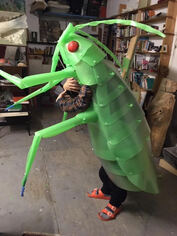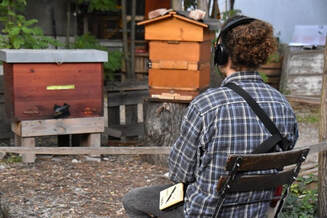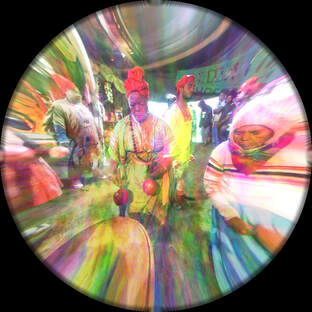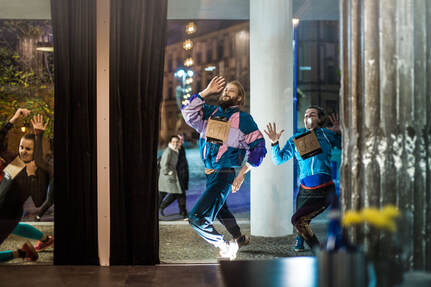ARTISTS & EXPERTS
Experts invited by B_Tour:
|
Omsk Social Club forks traditional methods of Live Action Role Play (Larp) through immersive installations and into Real Game Play (RGP) to induce states that could potentially be a fiction or a yet, unlived reality. Omsk works closely with networks of viewers, everything is unique and unrehearsed. The live installations they create examine virtual egos, popular experiences and political phenomena. Allowing the works to become a dematerialized hybrid of modern-day culture alongside the participant's unique personal experiences. In the past Omsk Social Club’s Real Game Play immersive environments have introduced landscapes and topics such as rave culture, survivalism, catfishing, desire&sacrifice, positive trolling, algorithmic strategies and decentralized cryptocurrency.
They have exhibited across Europe in various institutions, galleries, theatres and off-sites such as Martin Gropius Bau, House of Electronic Kunst Basel, Migros Museum für Gegenwartskunst, Zürich, HKW, Berlin, CCCB, Barcelona, Volksbühne, Berlin and Stems Gallery, Brussels. They have been included in 6th Athens Biennale (2018), Transmediale Festival (2019), The Influencers (2018) and Impakt Festival (2018). |
Caroline Hickman is a psychotherapist, University of Bath Lecturer & a member of the Climate Psychology Alliance (CPA) for whom she is creating a series of podcasts on Climate Psychology & Eco-Anxiety - ‘Climate Crisis Conversations - Catastrophe or Transformation’. She is currently researching children & young people’s feelings including eco-anxiety about the climate and biodiversity crisis to uncover and explore different stories, narratives and images around our defences against the 'difficult truth' of the climate and bio-diversity crisis, and hidden and ‘less conscious’ feelings about climate anxiety. She is passionate about getting ‘under the surface’ metaphorically and literally. Whenever she has the chance Caroline spends time underwater hanging out with fish, preferably sharks, and she is also slightly obsessed with seagrass and it’s CO2 absorbing properties.
|
Artists and Experts invited by them:
|
Club Real - Marianne Ramsay-Sonneck, Georg Reinhardt
The artists group Club Real has been devising and realising participatory site-specific projects since its foundation in 2000. In installations, one-to-one encounters, political role play and participatory urban development projects, they invite audiences to join in the creation and discovery of alternative constructs of reality. Within “Futur(e) Perfekt” they explore how resilient and valid connections between species can be established. Club Real experiments with establishing new power structures in which power is shared equally among all species/individuals involved. How can different species be included in a mutual political process? How can communication work? How can the concept of relationscapes change the way we live together in multi-species-assemblages? |
Expert: Aurelie Richards
Aurelie Richards is an author, performer, trans activist, body worker, and coach. Her writing includes publications and collaborations on the subject of reproductive justice, especially for people with transgender experiences, as well as queer/trans relationship models, such as applying her concept of trans relationscapes to the training of therapists and medical providers. She is currently in residency finishing her first novel. |
Christoph Rothmeier
Christoph Rothmeier is a multi-disciplinary artist and musician who received multiple awards for his artwork. His recent work includes installations, sound art, drawing and film, and concerns itself with different time models. He lives and works between Berlin and le Bouy.
For “Futur(e) Perfekt” he is working on an audio research into a possible future, investigating scenarios with the human body executing hibernation or estivation to save energy over long periods of time. A state of torpor that takes longer than half a life. Christoph is compiling a collection of statements that describe durations of being alive but not really being there - unconscious, semiconscious and conscious states that adapt to a changing environment.
Christoph Rothmeier is a multi-disciplinary artist and musician who received multiple awards for his artwork. His recent work includes installations, sound art, drawing and film, and concerns itself with different time models. He lives and works between Berlin and le Bouy.
For “Futur(e) Perfekt” he is working on an audio research into a possible future, investigating scenarios with the human body executing hibernation or estivation to save energy over long periods of time. A state of torpor that takes longer than half a life. Christoph is compiling a collection of statements that describe durations of being alive but not really being there - unconscious, semiconscious and conscious states that adapt to a changing environment.
|
Gabriel Vallecillo Márquez
Gabriel Vallecillo Márquez’s work expands across many artistic disciplines: video-poetry, video-jockey, 3D projection mapping, live cinema, video installation, documentary film and video performance. He has published four poetry books and has been included in Latin American anthologies. His video art installations have been featured at Biennials in Ecuador, Panamá, Nicaragua and Honduras. His artworks have also been exhibited in Cuba, Italy, USA and Germany. Gabriel has worked as a literature and philosophy teacher, cultural promoter, magazine and poetry book editor. He has a Master’s degree in Humanistic Studies with a specialization in Philosophy from the Instituto Tecnológico y de Estudios Superiores de Monterrey, where he graduated with honours. Gabriel is currently based in Berlin. For “Futur(e) Perfekt” he is researching symbols and rituals for the future in ancestral mesoamerican culture. He is developing artistic strategies that emulate or reproduce through technology an ancestral ritual of healing of the earth called “La compostura”, performed in Honduras and other parts of Mesoamerica under other names. The aim of this ritual is to give thanks to the earth for its future harvest. |
Expert: Arnulfo Ramírez
Arnulfo Ramírez Acosta is a historian and professor in the Department of History of the Faculty of Social Sciences at the Autonomous National University of Honduras (UNAH). He has experience as an assistant archaeologist in the Copan Acropolis Archaeological Project, under an agreement between UNAH, the Honduran Institute of Anthropology and History and the University of Harvard, and has given numerous lectures on historical topics, especially on the Mayan civilization and archaeoastronomy at national and international level. |
|
Paul Chaney
Paul Chaney is a self-taught artist whose practice explores the metrics of societal collapse and human/non-human relations through long-term engagement with land and agricultural processes. His most recent work explores digital computation and permaculture systems. Since 2016 he has led End of the World Garden – an off-grid artists’ residency and research platform in Cornwall UK. He has 20 years of experience as a horticulturalist and has spent much of his life living off-grid in a self-supporting permaculture system. In the frame of “Futur(e) Perfekt”, Paul is researching the relationship of agency between Artificial Intelligence and the natural world, asking: How could technics ever offer agency to the non-human, notwithstanding that the non-human has lost its agency as a consequence of technics itself? Does technology always have to serve the human first? Is it possible to challenge the current bias in digital computation, and teach an artificial intelligence about the existence of the biota from a non-anthropocentric perspective? Could an AI mediate future relationships between human and non-human with a preference for the non-human? Would the AI opt for a world without us? |
Expert: Jonathan Ledgard
Jonathan Ledgard is a novelist and an expert in advanced technology, nature, and risk in emerging markets. His 2006 novel “Giraffe” is considered a cult novel in the animal rights movement. He has been a fellow and director at the École Polytechnique Fédérale de Lausanne since 2012, and has been involved in promoting super advanced technology in Africa working with leading Artificial Intelligence scientists and roboticists to improve human lives in very poor communities and to protect nature. He often collaborates with major artists on projects exploring ecological themes. |
|
Jiří Honzirek
Jiří Honzírek is a director and scriptwriter of Divadlo Feste in Brno, Czech Republic. His performances are situated both in traditional theater spaces as well as in the public space of the city. In his work, he aims to tackle political, social and environmental issues. Jiří is also a member of the co2collective, an artistic group focusing on the climate crisis through theater and performance. In his research for “Futur(e) Perfekt”, using his philosophical, political, activist and artistic background, Jiří focuses on the speculative, theoretical question of near-future developments in the climate system, and the practical implications of future scenarios for the art world and current tendencies in contemporary art. |
Expert: Václav Janoščík
Václav Janoščík (1985) is a pedagogue, theorist and curator currently teaching at the Academy of Fine Arts (AVU), the Film and TV Academy (FAMU), and the Academy of Arts, Architecture and Design (UMPRUM) in Prague. He edited several volumes on problems of contemporary thinking, ranging from new materialism, speculative realism, acceleration, future studies and media theory (Object, 2015; Reinventing Horizons, 2016; Mind in Terrain, 2018). Last year, he published the book Nonsleeping (2018), giving a highly personal account of social acceleration and abstraction. |




